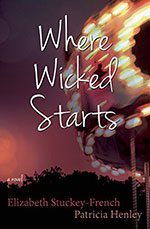 Elizabeth Stuckey-French and Patricia Henley, co-authors of Where Wicked Starts (Lacewing, 2014), both grew up loving girl-sleuth books. Nancy Drew, Trixie Belden, and Harriet the Spy were some of the characters in the stories that inspired Stuckey-French and Henley to write their new book. The story centers on step-sisters Nick and Luna as they attempt to uncover what's really happening in an unsettling relationship between a girl and an older man in their new town, Coquina Bay.
Elizabeth Stuckey-French and Patricia Henley, co-authors of Where Wicked Starts (Lacewing, 2014), both grew up loving girl-sleuth books. Nancy Drew, Trixie Belden, and Harriet the Spy were some of the characters in the stories that inspired Stuckey-French and Henley to write their new book. The story centers on step-sisters Nick and Luna as they attempt to uncover what's really happening in an unsettling relationship between a girl and an older man in their new town, Coquina Bay.
 "They think there's something creepy about them," Stuckey-French explains, referring to the girl and man, adding that the book is also the step-sisters' relationship and their friendship, "because they don't like each other at the beginning. They're step-sisters. Their parents have just gotten married. So it's also really about their family and their relationships—about them trying to figure out what's going on when the adults and their parents and most people just dismiss it, like they're just making stuff up."
"They think there's something creepy about them," Stuckey-French explains, referring to the girl and man, adding that the book is also the step-sisters' relationship and their friendship, "because they don't like each other at the beginning. They're step-sisters. Their parents have just gotten married. So it's also really about their family and their relationships—about them trying to figure out what's going on when the adults and their parents and most people just dismiss it, like they're just making stuff up."
Stuckey-French says she and Henley originally wrote the book for a younger audience, but that quickly changed.
"The mystery they're solving is kind of dark," she says. "We were thinking about a younger age group but now I think it kind of straddles young adult and more adult subject matter."
Literary themes are seamlessly woven into the detective story, an aspect of the book reviewers are praising.
Jon Sealy for the Richmond-Times Dispatch writes, "While this amateur-sleuth plot is complete with all the spying and clues you would expect from a classic Nancy Drew mystery, Henley and Stuckey-French bring their literary sensibilities to bear throughout, and imbue the story with the same care for language and insights into character for which each author is known."
Stuckey-French and Henley drew their inspiration for the story from a woman named Tracie Dean, who, in 2006, uncovered a kidnapping when she noticed strange interactions between a man and a girl at an Alabama convenience store. Dean took down the man's license plate number as he drove away, and when she returned to her home in Atlanta, she couldn't shake the feeling that something was wrong. She investigated the situation on her own and then called the police. They soon discovered that the man claiming to be the girl's grandfather had kidnapped the child.
"I thought it was fascinating that she was willing to listen to her intuition," Stuckey-French says, referring to Dean. She and Henley embed this same trust into their characters, Nick and Luna.
"Their determination to help the girl provides mystery and excitement to the plot," writes Marie Vernon in a book review for the St. Augustine Record. "But its strongest element is the well-drawn characters—a slightly off-the-wall grandmother, Luna's charming but irresponsible father, T.J. who becomes Luna's first crush, and even the snarky high-school queen, Bethany, all become as real as next-door neighbors. Likewise, the clever differentiations between the issues that concern a 14-year-old as opposed to those a 16-year-old faces are acutely drawn."
Coquina Bay is a fictional town based on St. Augustine, FL, where both Stuckey-French and Henley have taught writing workshops. Stuckey-French says they chose St. Augustine for inspiration because they liked the touristy feel that it offered. Setting the story in a place where people could just show up and pass through was very important to the plot.
Stuckey-French and Henley met at Purdue University, where Stuckey-French earned her bachelor's degree and took a writing course with Henley. The two became good friends, and after discovering their shared love for mysteries and fascination with Tracie Dean's story, they decided to write a book together. Each author wrote from one sister's point of view, and they sent chapters back and forth to each other.
"It was really fun," Stuckey-French says. "She would send me a chapter she'd written and I'd be thinking, 'I would never have thought of this in a million years. That was really fun.' It was like a writing exercise. Then I'd write my chapter and send it back to her and she said she had the same kind of reaction, like, 'Wow, I never would have thought to have that happen' … There were a lot more surprises in it. It was so great having somebody else's imagination at work."
Written by Grace Renninger
